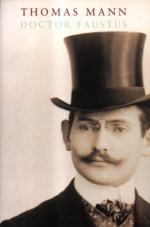|
This section contains 255 words (approx. 1 page at 300 words per page) |

|
As in The Magic Mountain (1924), expositions and discussions of ideas dominate Doctor Faustus. This time they are concentrated in the areas of theology, political theory, and, above all, musicology. Mann, a devotee of music but no musicologist, trained himself in the company of composers like Arnold Schonberg and Igor Stravinsky, musicians of the stature of Bruno Walter and Arthur Rubinstein, but relied most specifically on the advice of the noted philosopher of music Theodor Adorno.
The resulting analyses of real and fictitious musical compositions probably constitute the most sophisticated treatment of music in any work of literature. Much of it is unfortunately pitched at such a level of technical expertise that even the well-educated reader must feel excluded.
In his delineation of characters, Mann used the principle of historical montage more than in any of his other works. Leverkiihn's life and work are to hint at such disparate...
|
This section contains 255 words (approx. 1 page at 300 words per page) |

|




